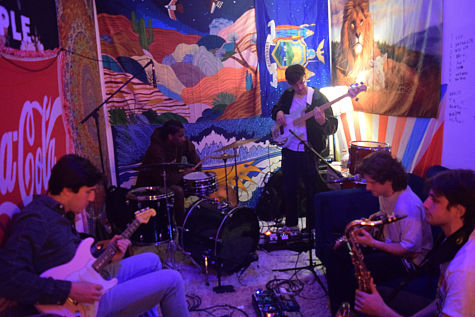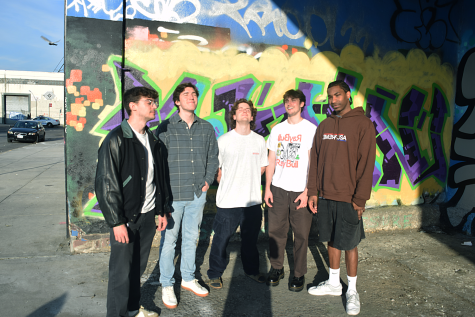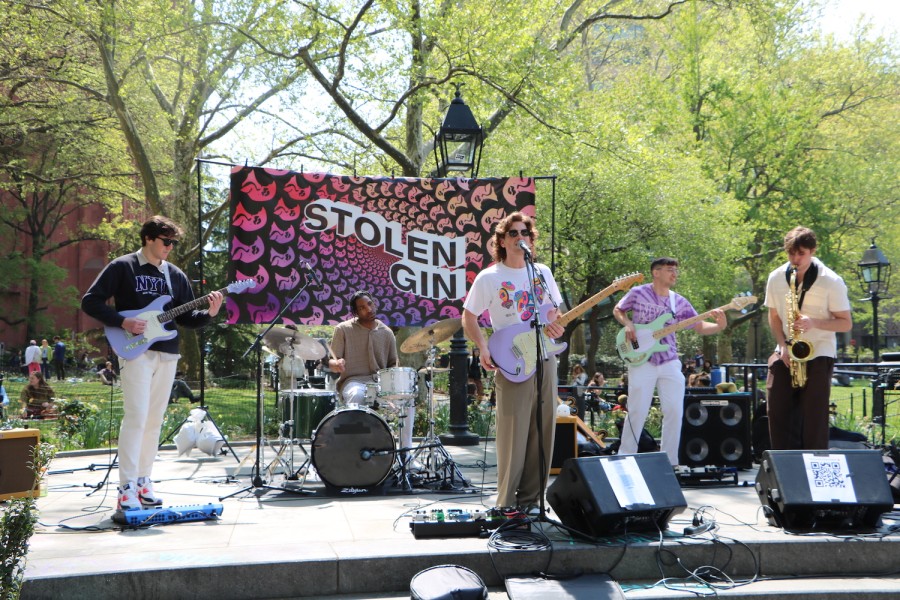Stolen Gin, the soundtrack to your spring
Meet the NYU grads with an eclectic sound that is equal parts Grateful Dead and Daft Punk.
May 3, 2023
If you ambled through Washington Square Park at any point on 4/20, chances are you caught the steadily growing crowd dancing to Stolen Gin’s jazzy performance. If you noticed the band’s NYU shirts, you likely guessed that its members met on campus. The sunny weather and eclectic danceability of the April 20 show, with the band’s covers ranging from “Casey Jones” to “Don’t Start Now,” distilled Stolen Gin’s vibrant sound. I think of Stolen Gin as a spring and summer band: a fitting soundtrack to the promised euphoria of the next few weeks’ sunny days.
Washington Square Park holds a sentimental value for the five members of Stolen Gin, who do think of themselves as an NYU band. Each is a recent NYU alum — or a soon-to-be graduate, with lead singer and lyricist Jackson Lardner graduating in two weeks. “It’s definitely really cool that we all went to the same college,” said guitarist Will Adler.
Though the park show was planned alongside the city rather than with NYU, Stolen Gin thinks of the performance as a kind of college show in the school’s de-facto quad. The band performed the same park show on April 13 last year, and was keen to repeat it on April 20 this year, specifically picking a weekday so that NYU students leaving class could stumble upon the show. They plan to repeat it annually, liking the idea of playing an NYU event down the line.
Covers of evergreen songs like “Estimated Prophet” and “Twist and Shout” scratch an itch for all of us who grew up listening to the Grateful Dead’s “American Beauty.” At first blush, Stolen Gin is a quintessential five-piece band: NYU music grads using their polished, jazzy instrumentals with impressive range and pop agreeability. But more time spent with their discography — two albums, released in 2019 and 2022, and a new single released on April 26 — will reveal an unexpected melange of influences. It is not every day that you can describe a band as being equal parts Grateful Dead and Daft Punk. But Stolen Gin sets out to torque the model of a previous generation’s improvisational live instrumental band with our era’s dance music culture.
Those who caught the April 20 Washington Square Park set likely caught on to Stolen Gin’s particular blend of tight live instrumentals with dancey house sounds. The band’s range of funk, rock and jazz influences refracts through a synthy, nu-disco sound, following in the footsteps of groups like L’Impératrice and Franc Moody. They cite Lotus and Parcels as exemplars among bands pulling off electronic music using deft live instrumentals. I would describe Stolen Gin as indietronica marked by a distinct jazz and funk influence — like if Vulfpeck produced on a Roland TB-303 (and was also younger and less nerdy).

Throughout its history, Stolen Gin songs have begun with Will Adler’s electronic demos as their starting point. Will produces an electronic track which the group will then play on their instruments and Lardner will write the lyrics. You add skillful, clean instrumentals to Will’s slick house beats, “write a chorus, and all of a sudden you’ve got a fucking song,” said Jacobson. According to Will, on the band’s last album “No Tonic,” at least half of the instrumentals started in this way.
“It’s a really good system,” Sawyer Adler said. “Will’s really, really good at producing electronic music — literally sitting at the computer and just knowing how to even get the ideas out. I might be able to sing it, or play it to people, but he can actually come in with a physical record.”
This electronic-driven songwriting process offers the band not only a dancey tempo but also a practical efficiency. “With five people coming into a room trying to play a new song together, it’s so hard to conceptualize what the end product is gonna be,” Will said. “Being able to come in with something to stick to and then build off of is the process that we’ve found works the best.”
But this clear electronic influence is by far the most palpable — not in the band’s songwriting, but in its infectious performance sensibility.
“We always want the crowd to be having fun,” Sawyer said. The band carefully threads a needle of danceability throughout its live instrumentals. The influence of classic, jam-heavy rock bands like Phish and the Grateful Dead is palpable in the band’s spirited live shows, which pulse with the energy of improvised instrumentals.
The band’s name is an homage to this bluesy rock tradition. “There was a Phish song called ‘Bathtub Gin,’ and that was one of the first songs I was into when I was really young,” Will said. And so, for the band’s first gig in March of 2019 at Pianos, Stolen Gin — at the time comprised of only Will, Jackson, and Sawyer — was briefly Bathtub Gin. The three then immediately received a cease and desist from a Phish cover band with the same name, of whose existence they hadn’t been aware.
“We joke that they stole our name,” Will said. “We couldn’t come up with anything we liked more than Bathtub Gin,” Lardner added. “So we went with the closest possible thing which had a backstory, which was Stolen Gin. And it worked.”
Their naming story distills exactly where Stolen Gin departs from an older generation’s tradition of improv-instrumental bands. They have their Phish influence, but their sound, driven by electronic dance music, does not in the least resemble that of a Phish cover band. Even when the band riffs on stage, they maintain a sort of measured calculation you would normally associate with a DJ — an adherence to the house tempos and the repetitive, mechanized beats that characterize dance music.
“If you’re just shredding all the time, that’s not good for dancing at all,” Sawyer said, describing the band’s live process. “It’s good for listening maybe, but it’s not good for dancing. Dancing is about just repetitive, super tight.”
A Stolen Gin show will go in whichever direction the crowd takes it. “We feed off the energy that the crowd gives us,” Lardner said. “Their reaction is key to what we end up doing and what direction we take it in, what song we play next.”
The band’s syncretism of genres and approaches owes largely to the range of classical and non-classical training backgrounds brought in by each member. Though its members met at NYU, Stolen Gin didn’t sprout from a shared conservatory program, ensemble class or even from a shared friend group. They trickled together organically over several years, until they felt a click — which only came last October, when the newest member, Farrell, joined as the drummer.

In its current makeup, Stolen Gin finds strength in its internal mixture of training backgrounds.
“I’d say my classical background primarily manifests itself in my organization and real rigid adherence to schedule,” said Sawyer, the bassist who was classically trained in the double bass. “I didn’t grow up playing in bands; this is the first band I’ve ever been in. I grew up doing recitals, taking lessons — juries and stuff. The whole thing is very intimidating, and it’s just so serious. I think I brought a hair of that seriousness here, which I think is something that a lot of bands are missing actually … a small amount of that attitude gets you really far.”
He notes the value not only of rehearsal discipline but also, as a young band serious about booking gigs and widening its profile, of a regimented attitude toward emails and bookings.
Stolen Gin’s sound has evolved as various members have joined and contributed their particular musical tastes and training backgrounds. But after settling into a rhythm in their current lineup, they have been trying to “keep it really funky and clean and dancy,” according to Sawyer.
“In terms of future stuff, I’d love to be in the position where we can essentially just do anything and most people would be on board,” he said. Fans can expect the band to only go in harder on its eclectic hew of influences.
“We’ve dabbled in songs that are a little rockier, some are a little spacier, some are super funky, others are poppy,” Lardner said. “We haven’t tread a straight line ever. Because our influences come from everywhere on the music spectrum, so why not use a little bit of everything.”
As Stolen Gin grows its sound, the band has become increasingly plastic in process and approach. The band wrote its new single in a different time signature, experimenting with a new recording process. Stolen Gin recorded its second album, “No Tonic,” released last October, by playing live in the same room. But when recording last week’s single, “Drunk Ambition,” they instead stacked instruments individually, multi-tracked. “We’re figuring out which recording process works for us,” Will said.
But through the band’s inevitable musical evolutions, they plan to hold on to their north star: music designed for a good time. Underneath all their textured instrumentals and clean production, Stolen Gin is primarily about, to use Jacobson’s words, “danceable fun music that is really thought out and well-executed.”
Contact Natasha R. Roy at [email protected].



























































































































































